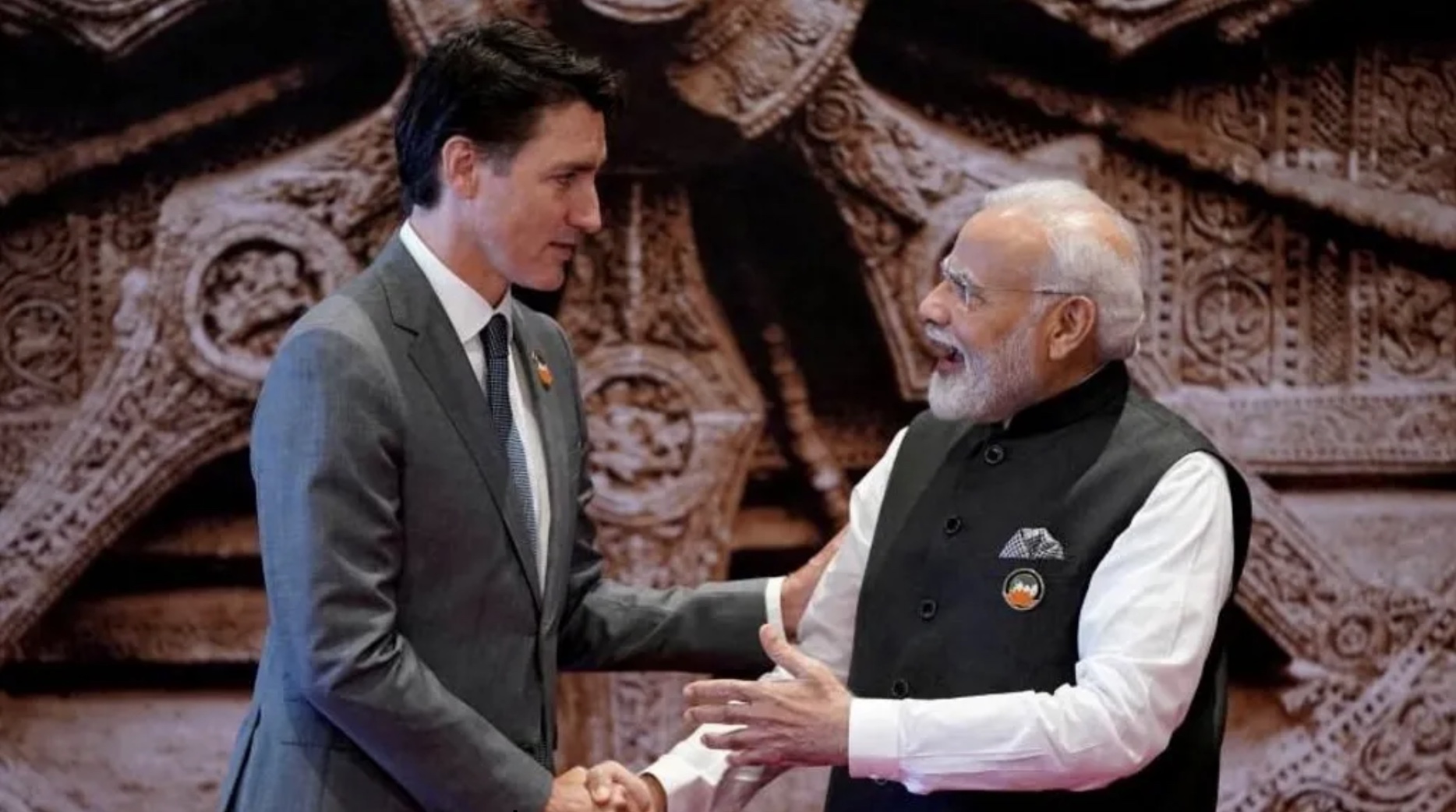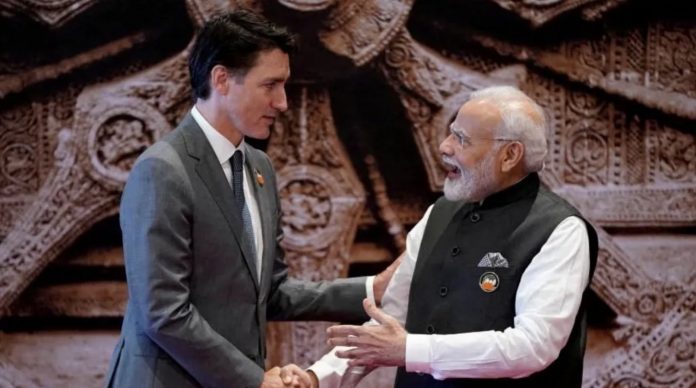ความขัดแย้งระหว่างอินเดียและแคนาดาที่เกิดขึ้นหลังจากรัฐบาลแคนาดาได้กล่าวหาว่าเจ้าหน้าที่อินเดียอาจมีส่วนเกี่ยวข้องกับการสังหารและการข่มขู่ในประเทศ ก่อให้เกิดความตึงเครียดทางการทูตอย่างหนัก ส่งผลให้เกิดคำถามว่าความสัมพันธ์ทางการค้าและการย้ายถิ่นฐานระหว่างทั้งสองประเทศจะได้รับผลกระทบอย่างไร
การค้าระหว่างสองประเทศมีมูลค่าหลายพันล้านดอลลาร์ และแคนาดาเป็นที่อยู่อาศัยของประชากรเชื้อสายอินเดียเกือบ 1.7 ล้านคน ความตึงเครียดในระดับนี้เป็นเรื่องใหม่ที่ยังไม่มีใครเคยเผชิญ และสิ่งที่จะเกิดขึ้นต่อไปขึ้นอยู่กับการดำเนินการของทั้งสองฝ่าย ผู้เชี่ยวชาญกล่าวว่าทั้งสองประเทศยังไม่ได้ใช้มาตรการตอบโต้ทางเศรษฐกิจหรือการขึ้นภาษี แต่ก็เตือนว่าความสัมพันธ์ที่เย็นชานี้อาจทำให้การเติบโตทางเศรษฐกิจชะลอตัวลงได้
อารีฟ ลาลานี ที่ปรึกษาอาวุโสของบริษัท StrategyCorp และอดีตนักการทูตแคนาดา กล่าวกับ BBC ว่า “ความท้าทายที่ใหญ่ที่สุด โดยเฉพาะอย่างยิ่งสำหรับธุรกิจและพลเมือง คือความไม่แน่นอน”
ทั้งสองประเทศได้เจรจาข้อตกลงการค้าทวิภาคีมาเป็นเวลากว่าทศวรรษแล้ว แต่แคนาดาได้หยุดการเจรจาในปีที่ผ่านมา ก่อนที่นายกรัฐมนตรีจัสติน ทรูโด จะออกมากล่าวหาต่อสาธารณชนว่าอินเดียมีส่วนเกี่ยวข้องกับการสังหารฮาร์ดีป ซิงห์ นิจจาร์ ผู้นำกลุ่มแบ่งแยกดินแดนชาวซิกข์ ที่ถูกยิงเสียชีวิตในเซอร์รี รัฐบริติชโคลัมเบียในเดือนมิถุนายน
อินเดียได้ระงับการออกวีซ่าชั่วคราวให้กับพลเมืองแคนาดาหลังเหตุการณ์ดังกล่าว แต่การดำเนินการดังกล่าวกินเวลาไม่นาน และกลับมาเปิดให้บริการวีซ่าอีกครั้งในเดือนพฤศจิกายน ขณะที่ความสัมพันธ์ทางการค้ายังคงเป็นปกติ โดยมีมูลค่าการค้าทวิภาคีประมาณ 8 พันล้านดอลลาร์สหรัฐ (6.15 พันล้านปอนด์) ตามข้อมูลล่าสุดจากกระทรวงพาณิชย์อินเดีย
รัฐมนตรีว่าการกระทรวงการค้าของแคนาดาได้ให้ความมั่นใจกับผู้ประกอบการว่ารัฐบาลไม่ต้องการทำให้ความสัมพันธ์ทางการค้ากับอินเดียหยุดชะงัก อย่างไรก็ตาม ลาลานีเตือนว่าความไม่แน่นอนนี้อาจทำให้ผู้ประกอบการจากทั้งสองประเทศชะลอการขยายตัวทางการค้า หรืออาจมองหาตลาดใหม่
อีกประเด็นหนึ่งที่น่ากังวลคือผลกระทบต่อการเคลื่อนย้ายผู้คนระหว่างสองประเทศ โดยอินเดียเป็นแหล่งนักศึกษาต่างชาติที่ใหญ่ที่สุดของแคนาดามาตั้งแต่ปี 2018 และประชากรราว 4% ของแคนาดามีเชื้อสายอินเดีย
การเชื่อมโยงทางมนุษย์ระหว่างประเทศของเรานั้นลึกซึ้งมาก คาราน ธุคราล ทนายความในนิวเดลี กล่าวกับ BBC เขาเสริมว่าลูกค้าส่วนใหญ่ของเขาคือผู้ที่ต้องการย้ายไปแคนาดา ซึ่งตอนนี้พวกเขารู้สึกกังวลเกี่ยวกับแผนการไปทำงานหรือเรียนต่อในแคนาดา
แม้ว่าการดำเนินการด้านการย้ายถิ่นฐานยังคงดำเนินไปตามปกติ ธุคราลแนะนำให้ลูกค้าคาดการณ์ถึงความล่าช้าที่อาจเกิดขึ้น เนื่องจากจำนวนเจ้าหน้าที่ทูตที่ลดลงในทั้งสองประเทศ
นอกจากนี้ คนที่อาศัยอยู่ในแคนาดาที่มีครอบครัวอยู่ในอินเดียก็รู้สึกกังวลว่าอินเดียอาจจะกลับมาจำกัดการออกวีซ่าให้กับพลเมืองแคนาดาอีกครั้ง
การจำกัดวีซ่าอาจส่งผลกระทบต่อการค้า การท่องเที่ยว และการลงทุน เจฟฟ์ แนนคีเวลล์ ประธานมูลนิธิเอเชียแปซิฟิกแห่งแคนาดากล่าวว่า “รัฐบาลอินเดียได้แสดงให้เห็นแล้วครั้งหนึ่งว่าพร้อมจะระงับการออกวีซ่า จึงเป็นไปได้ว่าพวกเขาอาจทำอีกครั้ง” เขากล่าว พร้อมเสริมว่าผลกระทบมากที่สุดจะเกิดขึ้นในชุมชนชาวอินเดียขนาดใหญ่ในแคนาดา
แนนคีเวลล์เชื่อว่าสถานการณ์ทางการทูตนี้จะยังคงพัฒนาไปอีก และผลกระทบจะยังคงอยู่เป็นเวลานาน ขณะที่ตำรวจกำลังดำเนินการทางกฎหมายกับผู้ที่เกี่ยวข้องกับการสังหารนิจจาร์และการกระทำผิดอื่น ๆ
“นี่จะทำให้สถานการณ์ร้อนแรงขึ้นเรื่อย ๆ” เขากล่าว โดยมีการจับกุมคน 4 คนซึ่งทั้งหมดเป็นชาวอินเดียในวัย 20 ปี แต่ยังไม่ชัดเจนว่าพวกเขามีความเกี่ยวข้องกับรัฐบาลอินเดียหรือไม่ และการพิจารณาคดีของพวกเขายังไม่มีการกำหนดวัน
ตำรวจแคนาดากล่าวในสัปดาห์นี้ว่ากำลังมี “การสอบสวนหลายคดีที่กำลังดำเนินอยู่” เกี่ยวกับการมีส่วนร่วมของเจ้าหน้าที่รัฐบาลอินเดียใน “กิจกรรมอาชญากรรมร้ายแรง” ในแคนาดา
เมื่อวันพุธ ทรูโดได้กล่าวย้ำถึงข้อกล่าวหาต่ออินเดีย โดยวิจารณ์อย่างหนักต่อการแทรกแซงที่ก้าวร้าวของอินเดียในอธิปไตยของแคนาดา แต่เขายังเตือนว่าเขาไม่ต้องการทำลายความสัมพันธ์ทางเศรษฐกิจและสังคม
“เราไม่ต้องการเผชิญหน้ากับคู่ค้ารายใหญ่ที่เรามีความสัมพันธ์เชิงลึกระหว่างประชาชน และมีประวัติศาสตร์ยาวนาน รวมถึงเรายังเป็นประเทศประชาธิปไตยเช่นเดียวกัน” ทรูโดกล่าวต่อคณะกรรมาธิการที่กำลังสอบสวนการแทรกแซงของต่างชาติในแคนาดา
อินเดียโต้กลับอย่างรุนแรง โดยกล่าวหาว่าพฤติกรรมของทรูโด “ประมาท” และกล่าวหาแคนดาว่ายังไม่มีหลักฐานมายืนยันข้อกล่าวหา
เมื่อต้นสัปดาห์ อินเดียระบุว่ายัง “สงวนสิทธิ์ในการดำเนินการเพิ่มเติม” เพื่อตอบโต้ ขณะที่รัฐมนตรีต่างประเทศแคนาดา เมลาเนีย โจลี กล่าวว่าทางเลือกทั้งหมด รวมถึงการคว่ำบาตร ยังอยู่บนโต๊ะ
How the India-Canada fallout could affect trade and immigration

After a bombshell accusation from Canadian officials this week – that they believe India government agents were linked to a campaign of murder and extortion in the country – diplomatic relations hit new lows.
That rift is now raising questions over the impact it could have on the deep trade and immigration ties between both countries.
Bilateral trade is worth billions of dollars, and Canada is home to nearly 1.7 million people of Indian origin.
The breakdown of relations at this level is uncharted territory, and much of what happens next will depend on how they choose to move forward, experts suggest.
Neither country has imposed tariffs or other economic forms of retaliation, but experts caution that this could change, and that a cooling relationship between India and Canada could hinder further economic growth.
“The biggest challenge, particularly for business and citizens, is going to be uncertainty,” Arif Lalani, a senior advisor at government consulting company StrategyCorp and a former Canadian diplomat, told the BBC.
The two countries have been negotiating a bilateral trade deal on and off for over a decade, but Canada paused talks last year shortly before Prime Minister Justin Trudeau first made a public accusation against India.
In September 2023, Trudeau said that Canada had “credible allegations” linking Indian government agents to the murder of Sikh separatist Hardeep Singh Nijjar, who was shot and killed in Surrey, British Columbia that June.
India temporarily suspended visas for Canadian citizens shortly after, but that move was brief and it resumed visa processing in November.
Trade ties between the two, meanwhile, remained as usual. Bilateral trade is around $8bn (£6.15bn), according to the latest fiscal figures from India’s trade ministry.
Canada’s trade minister recently assured business owners that Ottawa does seek to disrupt commercial ties with India.
Still, with ongoing uncertainty, Mr Lalani said businesspeople from both countries could look elsewhere for opportunities.
“People will be thinking twice in terms of expanding trade, or trying to build on what they already have,” he said.
Another big concern is how the rift will alter movement of people between the two countries. India has been Canada’s top source of international students since 2018, and about 4% of Canada’s overall population is of Indian origin.
“The human connection between our countries is profound,” Karan Thukral, a lawyer based in Delhi, told the BBC, adding that a big portion of his clientele are people eager to move to Canada.
He said many are now anxious about how the diplomatic tension could affect their plans to work or study in Canada.
Immigration processing remains operational, Mr Thukral noted, but he has advised his clients to anticipate potential delays due to the reduction of diplomatic staff in both countries.
Others, especially those in Canada with family in India, are anxious about India reinstating visa restrictions for Canadian nationals, he added.
Any visa restrictions would come with business implications and could have a dampening effect on trade, tourism and investment, said Jeff Nankivell, president of the Asia Pacific Foundation of Canada.
“The Indian government has already shown its willingness once to suspend the visa issuance, so it’s possible they could do so again,” he said, adding the biggest impact will be felt in Canada’s large Indian diaspora community.
Mr Nankivell said that he suspects the diplomatic situation will continue to evolve, and the fallout will be felt for a long time as Canadian police pursue legal action against those allegedly complicit in Mr Nijjar’s death and other criminal acts.
“That’s going to continue to raise the temperature,” he said.
Four people have been arrested and charged in connection with Mr Nijjar’s murder – all Indian nationals in their 20s – though it remains unclear if and how they are connected to India’s government.
A trial date for them has not yet been scheduled.
Canadian police said this week there are “multiple ongoing investigations” into the alleged involvement of India government agents in “serious criminal activity” in Canada.
On Wednesday, Trudeau doubled-down on accusations against India with sharp criticism of Delhi’s alleged aggressive interference in Canada’s sovereignty.
But he also cautioned that he does not want to hurt economic and social ties.
“We don’t want to be in this situation of picking a fight with a significant trading partner, with whom we have deep people-to-people ties and a long history and are fellow democracies,” Trudeau told a public inquiry looking into foreign interference in the country.
India hit back angrily, calling Trudeau’s behaviour “cavalier” and accusing Canada of not presenting evidence to back up its accusations.
Earlier this week, India said that it “reserves the right to take further steps” in its response, while Canada’s foreign minister Mélanie Joly said all options, including sanctions, are on the table.
By Nadine Yousif, BBC News

















